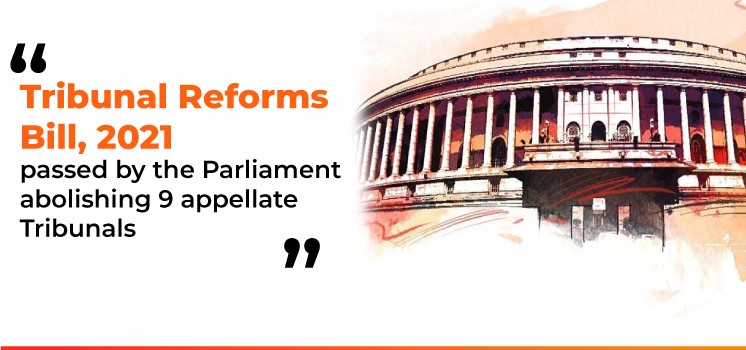CURRENT AFFAIRS
Get the most updated and recent current affair content on Padhaikaro.com
Tribunal Reforms Bill 2021
- Integrity Education, Delhi
- 17, Aug 2021

Why in news: SC raises query on Tribunal Reforms Bill
The Bill seeks to dissolve certain existing appellate bodies and transfer their functions (such as adjudication of appeals) to other existing judicial bodies
Transfer of functions of key appellate bodies as proposed under the Bill
|
Acts |
Appellate Body |
Proposed Entity |
|
The Cinematograph Act, 1952 |
Appellate Tribunal |
High Court |
|
The Trade Marks Act, 1999 |
Appellate Board |
High Court |
|
The Copyright Act, 1957 |
Appellate Board |
High Court |
|
The Customs Act, 1962 |
Authority for Advance Rulings |
High Court |
|
The Patents Act, 1970 |
Appellate Board |
High Court |
|
The Airports Authority of India Act, 1994 |
Airport Appellate Tribunal |
|
|
The Control of National Highways (Land and Traffic) Act, 2002 |
Airport Appellate Tribunal |
Civil Court |
|
The Geographical Indications of Goods (Registration and Protection) Act, 1999 |
Appellate Board |
High Court |
Changes in the process of appointment of certain other tribunal
Bill provides for uniform pay and rules for the search and selection committees across tribunals
Central government shall, on the recommendation of the Search-cum-Selection Committee, remove from office any Chairperson or a Member, who—
(a) has been adjudged as an insolvent; or
(b) has been convicted of an offence which involves moral turpitude; or
(c) has become physically or mentally incapable of acting as such Chairperson or Member; or
(d) has acquired such financial or other interest as is likely to affect prejudicially his functions as such Chairperson or Member; or
(e) has so abused his position as to render his continuance in office prejudicial to the public interest.
-
Chairpersons and judicial members of tribunals are former judges of High Courts and the Supreme Court
-
In the Search-cum-Selection Committee for state tribunals, the Bill brings in the Chief Secretary of the state and the Chairman of the Public Service Commission of the concerned state who will have a vote and Secretary or Principal Secretary of the state’s General Administrative Department with no voting right.
-
The Chief Justice of the High Court, who would head the committee, will not have a casting vote.